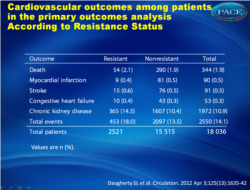Resistant hypertension: Incidence and prognosis
This retrospective cohort study provides insight into the incidence and prognosis of resistant hypertension. Greater efforts should be made to improve outcomes in patients with resistant hypertension to decrease the risk of cardiovascular events.
Incidence and prognosis of resistant hypertension in hypertensive patientsLiterature - Daugherty SL et al. Circulation. 2012 Apr 3
Daugherty SL, Powers JD, et al.
Circulation. 2012 Apr 3;125(13):1635-42.
Background
Resistant hypertension is defined as blood pressure that remains above goal despite the concurrent use of 3 different antihypertensive drugs at optimal doses [1]. This publication provides information on the incidence and prognosis of resistant hypertension in the US.Methods
Patients with incident hypertension started on treatment were included between 2002 and 2006 in a retrospective cohort study. Development of resistant hypertension and cardiovascular events were evaluated.Main results
- 1.9% developed resistant hypertension within 1.5 years from initial treatment (-.7 cases/100 patient years)
- Approximately 1 in 6 patients taking ≥ 3 hypertension drug classes for at least 1 month continued to have resistant hypertension over follow-up
- Patients with resistant hypertension had an almost 50% higher chance to have a cardiovascular event over 3.8 years of follow-up
 ConclusionBecause of the high risk for developing cardiovascular events, greater efforts should be made to improve outcomes in patients with resistant hypertension. |
Editorial comment
[2]“These current findings highlight the clinical reality that a growing proportion of patients will need a large number of medications (ie, >3) to control their blood pressure.Perhaps the most important and most intriguing finding of this study is the considerably increased cardiovascular risk manifest in subjects with resistant hypertension. The study demonstrated a 50% increase in cardiovascular events (largely attributable to development of chronic kidney disease) in patients with resistant hypertension compared with patients whose blood pressure had been controlled on 3 medications. Compared with all subjects being newly treated for hypertension, the risk of cardiovascular events in patients diagnosed with resistant hypertension was increased by 2 fold. A factor separate from blood pressure burden may be accelerating cardiovascular disease progression in patients with resistant hypertension, which might be hyperaldosteronism. This should be further investigated”
References
1. Calhoun DA, Jones D, et al. Resistant hypertension: diagnosis, evaluation, and treatment: a scientific statement from the American Heart Association Professional Education Committee of the Council for High Blood Pressure Research. Circulation. 2008;117:e510–e526.
2. Pimenta E, Calhoun DA. Resistant hypertension: incidence, prevalence, and prognosis. Circulation. 2012 Apr 3;125(13):1594-6.
Abstract
BACKGROUND: Despite a recent American Heart Association (AHA) consensus statement emphasizing the importance of resistant hypertension, the incidence and prognosis of this condition are largely unknown.METHODS AND RESULTS: This retrospective cohort study in 2 integrated health plans included patients with incident hypertension in whom treatment was begun between 2002 and 2006. Patients were followed up for the development of resistant hypertension based on AHA criteria of uncontrolled blood pressure despite use of ≥3 antihypertensive medications, with data collected on prescription filling information and blood pressure measurement. We determined incident cardiovascular events (death or incident myocardial infarction, heart failure, stroke, or chronic kidney disease) in patients with and without resistant hypertension with adjustment for patient and clinical characteristics. Among 205 750 patients with incident hypertension, 1.9% developed resistant hypertension within a median of 1.5 years from initial treatment (0.7 cases per 100 person-years of follow-up). These patients were more often men, were older, and had higher rates of diabetes mellitus than nonresistant patients. Over 3.8 years of median follow-up, cardiovascular event rates were significantly higher in those with resistant hypertension (unadjusted 18.0% versus 13.5%, P<0.001). After adjustment for patient and clinical characteristics, resistant hypertension was associated with a higher risk of cardiovascular events (hazard ratio, 1.47; 95% confidence interval, 1.33-1.62).
CONCLUSIONS: Among patients with incident hypertension in whom treatment was begun, 1 in 50 patients developed resistant hypertension. Patients with resistant hypertension had an increased risk of cardiovascular events, which supports the need for greater efforts toward improving hypertension outcomes in this population.
